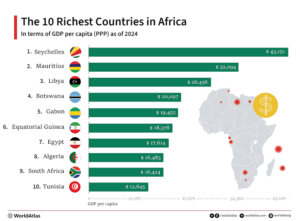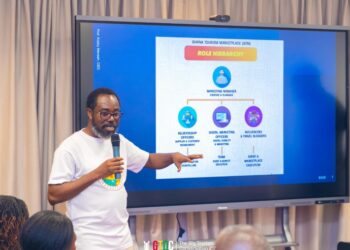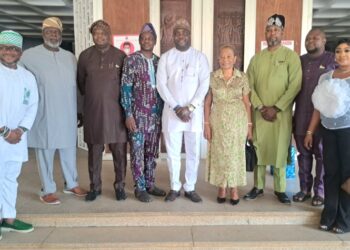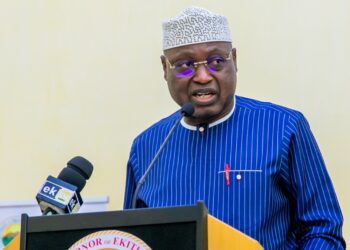Seychelles, an archipelago located in the Indian Ocean, holds the distinguished title of being the richest country in Africa when assessed by GDP per capita. As of recent statistics, the nation exhibits a robust economic landscape characterized by noteworthy indicators, including a per capita income exceeding $15,000, a reflection of its successful economic policies and development strategies. The minimum wage in Seychelles is also competitive, contributing to a relatively high standard of living for its populace.
The economic prosperity of Seychelles can be attributed primarily to three significant sectors: tourism, fisheries, and financial services. Tourism dominates the economy, accounting for a considerable portion of GDP, with visitors drawn to the islands’ pristine beaches, rich biodiversity, and vibrant culture. The government’s efforts to promote sustainable tourism practices have enriched its environmental and economic viability, making it a model for others in the region.
Fisheries also play a pivotal role in Seychelles’ economy, providing employment opportunities and serving both local consumption and export markets. The sustainable management of its marine resources has not only preserved the ecological balance but also ensured food security and economic stability. The country has established itself as a center for tuna processing, which is a critical component of its export-led growth strategy.

In addition, the financial services sector in Seychelles has seen significant growth, becoming a hub for offshore banking and investment. Regulatory frameworks established by the government encourage foreign investments while ensuring compliance with international standards. This diversification of the economy underlines Seychelles’ commitment to sustainable and equitable development.
Historically, Seychelles has transitioned from a primarily agricultural-based economy to one that is more diversified and resilient. The nation’s focus on education, healthcare, and infrastructure development has been instrumental in facilitating its economic progression. Overall, Seychelles stands as a prime example of how a small island nation can achieve substantial wealth and development through strategic planning and resource management.
Education and Literacy: A Key to Development
Seychelles stands out in Africa as a beacon of educational excellence, boasting an impressive literacy rate of 95.9%. This remarkable achievement underscores the nation’s commitment to fostering educational access and promoting learning at all levels. The government of Seychelles has implemented comprehensive educational policies aimed at ensuring that all citizens receive quality education, starting from early childhood and extending through secondary and tertiary levels.
The educational system in Seychelles is characterized by its inclusivity and emphasis on equitable access for all students, regardless of their socio-economic background. The curriculum is designed to equip students with essential skills, fostering critical thinking and creativity. By prioritizing a holistic educational framework, Seychelles is able to nurture not just academically proficient individuals, but also well-rounded citizens who are prepared to contribute positively to society.
Education in Seychelles plays a significant role in shaping the workforce. With a high literacy rate, the population possesses the necessary skills to participate effectively in various sectors of the economy. This availability of a skilled labor force has positively impacted economic development, as industries can rely on well-informed individuals capable of performing tasks efficiently. Moreover, the investment in education directly correlates with social well-being, as a higher level of education contributes to lower unemployment rates and a reduction in poverty levels.
Furthermore, the government continually evaluates and updates educational policies to adapt to changing global trends and labor market demands. This proactive approach ensures that Seychelles not only maintains its high literacy rate but also cultivates a dynamic workforce that can thrive in an increasingly competitive world. Such a commitment to education is a testament to Seychelles’ understanding of its central role in sustainable development and economic prosperity.
Social Welfare: Healthcare and Employment in Seychelles
Seychelles stands out as a model of social welfare in Africa, particularly through its comprehensive healthcare system and robust employment rates. The nation offers free healthcare services to all its citizens, a commitment that significantly enhances the quality of life for Seychellois. This universal healthcare coverage ensures that every individual has access to essential medical services, from preventive care to emergency treatments, without the burden of financial constraints. By prioritizing public health, Seychelles not only improves individual health outcomes but also fosters a healthier workforce that is crucial for economic development.
In addition to its healthcare achievements, Seychelles boasts a remarkably low unemployment rate of approximately 3%. This statistic reflects the country’s effective employment strategies, which have successfully absorbed a significant portion of the local workforce. The government has implemented various policies to promote job creation and protect workers’ rights, contributing to a stable labor market. Furthermore, the diverse economic landscape of Seychelles, primarily driven by tourism, fishing, and agriculture, provides a wide range of employment opportunities. This balanced approach to employment successfully mitigates potential socio-economic issues, such as crime and poverty, often prevalent in other African nations with higher unemployment rates.
Comparatively, while many African countries struggle with inadequate healthcare systems and soaring unemployment rates, Seychelles demonstrates that a well-funded public welfare system can lead to social stability and economic resilience. The nation’s proactive investments in both healthcare and employment create a virtuous cycle, allowing the government to harness a productive workforce that, in turn, bolsters its economic growth. This model serves as an illustrative example of how nations can effectively prioritize the welfare of their citizens, fostering a society that thrives on health and job security.
Global Access: The Power of the Seychellois Passport
The Seychellois passport stands as a remarkable symbol of mobility and connectivity, granting its holders access to 156 countries and territories worldwide. This elevation to having the most powerful passport in Africa significantly enhances the global positioning of Seychellois citizens, facilitating ease of travel without the extensive bureaucratic hurdles often associated with visa applications. Notably, this achievement not only benefits the individual travelers but also reflects positively on Seychelles as a favored tourist destination.
By allowing access to nations across various continents, the Seychellois passport opens numerous opportunities for tourism and international relations. Tourists from Seychelles can travel to economically vibrant countries, fostering cultural exchanges and promoting Seychelles as a tourism hotspot. This ease of travel encourages visitors from abroad to explore the beauty and biodiversity of the archipelago, further enriching the nation’s economy through tourism revenues.
Moreover, the robust passport options available to Seychellois citizens play a significant role in enhancing international relations. The ease of movement it provides can lead to improved diplomatic ties, trade agreements, and collaborations with other nations. As Seychellois individuals engage freely with the global community, it cultivates a landscape of shared knowledge and experience, which ultimately contributes to the development of Seychelles on both economic and social fronts.
In light of these advantages, the Seychellois passport’s extensive global access is not merely a primary tool for travel but a strategic asset that empowers individuals while positioning Seychelles as a significant player on the world stage. The implications for Seychellois citizens extend beyond tourism, enhancing their ability to partake in global opportunities, settle abroad, and engage in international business. This dynamic approach to global access serves as a catalyst for national growth, reflecting Seychelles’ commitment to development and prosperity.










